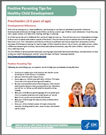Preschoolers (3-5 years of age)
 Developmental Milestones
Developmental Milestones
Skills such as naming colors, showing affection, and hopping on one foot are called developmental milestones. Developmental milestones are things most children can do by a certain age. Children reach milestones in how they play, learn, speak, behave, and move (like crawling, walking, or jumping).
As children grow into early childhood, their world will begin to open up. They will become more independent and begin to focus more on adults and children outside of the family. They will want to explore and ask about the things around them even more. Their interactions with family and those around them will help to shape their personality and their own ways of thinking and moving. During this stage, children should be able to ride a tricycle, use safety scissors, notice a difference between girls and boys, help to dress and undress themselves, play with other children, recall part of a story, and sing a song.
Positive Parenting Tip Sheet
Positive Parenting Tips
Following are some of the things you, as a parent, can do to help your preschooler during this time:
- Continue to read to your child. Nurture her love for books by taking her to the library or bookstore.
- Let your child help with simple chores.
- Encourage your child to play with other children. This helps him to learn the value of sharing and friendship.
- Be clear and consistent when disciplining your child. Explain and show the behavior that you expect from her. Whenever you tell her no, follow up with what he should be doing instead.
- Help your child develop good language skills by speaking to him in complete sentences and using "grown up" words. Help him to use the correct words and phrases.
- Help your child through the steps to solve problems when she is upset.
- Give your child a limited number of simple choices (for example, deciding what to wear, when to play, and what to eat for snack).
Child Safety First
As your child becomes more independent and spends more time in the outside world, it is important that you and your child are aware of ways to stay safe. Here are a few tips to protect your child:
- Tell your child why it is important to stay out of traffic. Tell him not to play in the street or run after stray balls.
- Be cautious when letting your child ride her tricycle. Keep her on the sidewalk and away from the street and always have her wear a helmet.
- Check outdoor playground equipment. Make sure there are no loose parts or sharp edges.
- Watch your child at all times, especially when he is playing outside.
- Be safe in the water. Teach your child to swim, but watch her at all times when she is in or around any body of water (this includes kiddie pools).
- Teach your child how to be safe around strangers.
- Keep your child in a forward-facing car seat with a harness until he reaches the top height or weight limit allowed by the car seat’s manufacturer. Once your child outgrows the forward-facing car seat with a harness, it will be time for him to travel in a booster seat, but still in the back seat of the vehicle. The National Highway Traffic Safety Administration has information on how to keep your child safe while riding in a vehicle.
Healthy Bodies
- Eat meals with your child whenever possible. Let your child see you enjoying fruits, vegetables, and whole grains at meals and snacks. Your child should eat and drink only a limited amount of food and beverages that contain added sugars, solid fats, or salt.
- Limit screen time for your child to no more than 1 to 2 hours per day of quality programming, at home, school, or child care.
- Provide your child with age-appropriate play equipment, like balls and plastic bats, but let your preschooler choose what to play. This makes moving and being active fun for your preschooler.
For More Information
CDC’s "Learn the Signs. Act Early." Campaign
For more details on developmental milestones, warning signs of possible developmental delays, and information on how to help your child’s development, visit the "Learn the Signs. Act Early." campaign website.
CDC’s Parent Information (Children 4−11 years)
This site has information to help you guide your child in leading a healthier life.
CDC's Childhood Overweight and Obesity Information.
Visit this site for facts and solutions for childhood overweight and obesity.
CDC's Healthy Weight Information.
Tips for parents – Ideas to help children maintain a healthy weight.
American Academy of Pediatrics—Developmental Stages
Visit the American Academy of Pediatrics for health topics by developmental stages.
Bright Futures
Bright Futures provides information on what to expect as your child grows, including parenting tips.
Choose My Plate- Preschoolers
The U.S. Department of Agriculture provides information on health and nutrition for children 2 through 5 years of age.
HealthyChildren.org
AAP's Healthy Children website provides information on feeding, nutrition, and fitness for all developmental stages from infancy to young adulthood.
Just in Time Parenting (JITP)
Quality, research-based information to families at the time it can be most useful.
Let's Move - Child Care
You will find information on physical activity for young children and on ways to keep them moving.
National Highway Traffic Safety Administration (NHTSA)
NHTSA has information on safety recalls and safety tips for children riding in motor vehicles, walking, biking, playing outside, waiting at school bus stops, and more.
Contact Us:
- Centers for Disease Control and Prevention
National Center on Birth Defects and Developmental Disabilities
Division of Human Development and Disability
Mail-Stop E88
1600 Clifton Road
Atlanta, GA 30333
- 800-CDC-INFO
(800-232-4636)
TTY: (888) 232-6348
New Hours of Operation
8am-8pm ET/Monday-Friday
Closed Holidays - cdcinfo@cdc.gov


